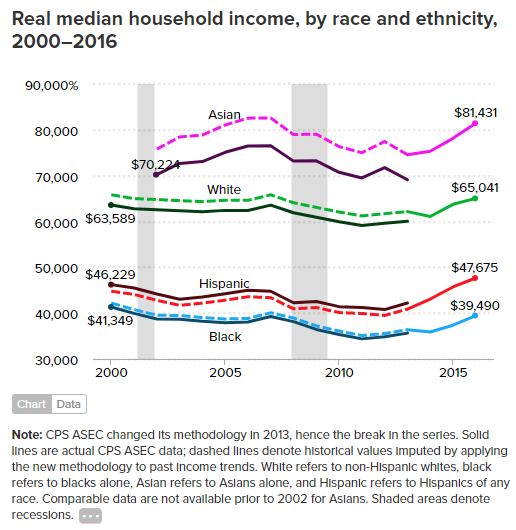Did you know that Truthout is a nonprofit and independently funded by readers like you? If you value what we do, please support our work with a donation.
Last week’s Census release of data on income, poverty, and health insurance demonstrated two things: There are policies that work for people who are struggling, and there is still a lot of work left to do — especially for people of color in America.
It is encouraging that the people who saw the worst losses in the years since the Great Recession — specifically African Americans and Hispanics — saw the biggest earnings gains for the second consecutive year. Real median incomes increased 5.7 percent to $39,490 among African Americans and 4.3 percent to $47,675 among Hispanics. But the racial income gap is still stark — the median income among non-Hispanic whites stands at $65,041.
 Source: Economic Policy Institute.
Source: Economic Policy Institute.
The racial wage gap also persists as black men earned 71 cents for every dollar earned by white men in 2016, and Hispanic men earn 66 cents on the dollar. Among women, it has actually grown worse since 2007: Black women now earn 79 cents for every dollar earned by white women, and Hispanic women earn 69 cents on the dollar.
It is therefore not surprising that although poverty rates for all groups were down, they remain highest among African Americans (22 percent) and Hispanics (19.4 percent), compared with whites (8.8 percent). African American and Hispanic children continue to face the highest poverty rates at nearly 31 percent and 27 percent, respectively. African American children are three times more likely to be in poverty than white children.
 Source: Economic Policy Institute.
Source: Economic Policy Institute.
While the Census releases new data every September, it is notable that the solutions remain the same every year: People need investments in quality training and good jobs in their communities; they need a safety net that protects our basic living standards for food, housing, health care, retirement (Social Security); they need access to good schools and higher education; they need child care that doesn’t cost more than a year of college tuition; and they need a minimum wage that isn’t a poverty wage.
Many of the key policies that helped people in poverty achieve some gains are at stake in upcoming congressional debates on the budget. Conservatives will continue to go after the investments that cut poverty in half year-in and year-out, such as Medicaid and affordable health care. They will call for tax cuts for the wealthiest Americans, even though the wealthiest 5 percent already captured 22.5 percent of all income last year. Nowhere on the agenda is there discussion of a just minimum wage and a real jobs plan that would target those who continue to struggle at the economic margins — disproportionately people of color — doing low-wage or unpaid work.
Recent gains need to be protected in the current political environment, but we also need to stay focused on a vision of how every man, woman, and child has the opportunity to fully participate in our economy and thrive.
A terrifying moment. We appeal for your support.
In the last weeks, we have witnessed an authoritarian assault on communities in Minnesota and across the nation.
The need for truthful, grassroots reporting is urgent at this cataclysmic historical moment. Yet, Trump-aligned billionaires and other allies have taken over many legacy media outlets — the culmination of a decades-long campaign to place control of the narrative into the hands of the political right.
We refuse to let Trump’s blatant propaganda machine go unchecked. Untethered to corporate ownership or advertisers, Truthout remains fearless in our reporting and our determination to use journalism as a tool for justice.
But we need your help just to fund our basic expenses. Over 80 percent of Truthout’s funding comes from small individual donations from our community of readers, and over a third of our total budget is supported by recurring monthly donors.
Truthout has launched a fundraiser to add 310 new monthly donors in the next 4 days. Whether you can make a small monthly donation or a larger one-time gift, Truthout only works with your support.
